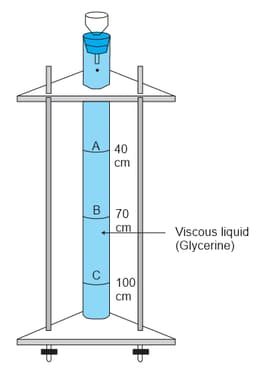Lab Activity: To Find Coefficient of Viscosity of a Viscous Liquid
Lab Activity: To Find Coefficient of Viscosity of a Viscous Liquid: Overview
This Topic covers sub-topics such as Calculations Performed to Find Coefficient of Viscosity of a Viscous Liquid, Apparatus Used to Find Coefficient of Viscosity of a Viscous Liquid and, Principle Used to Find Coefficient of Viscosity of a Viscous Liquid
Important Questions on Lab Activity: To Find Coefficient of Viscosity of a Viscous Liquid
Cotyledons are also called-
How does the transparency of the liquid used in the experiment to find the coefficient of viscosity of a viscous liquid impact the accuracy of the results?
When a spherical body falls into a viscous liquid with terminal velocity, how its weight is balanced?
A spherical ball is made to fall through a viscous liquid. The terminal velocity attained by the spherical body will not depend on which of the following factors?
Terminal velocity varies linearly with the square of the radius of the spherical ball falling within a viscous liquid. Which one of the following is the correct formula for calculating the viscosity of the liquid using the graph plotted between these two quantities?( and are densities of the spherical ball and the liquid respectively)
A steel ball falls along the axis of the tube filled with a viscous liquid as shown in the figure below.

Two stopwatches started as the ball reached point A. The time taken by the ball to reach B is and to reach at C is . If the terminal velocity is attained by the ball before crossing point A then which of the following statements is correct?
A student performed the experiment and recorded the observations for terminal velocity and the radius of a spherical ball to find the viscosity of a liquid. What are the quantities that must be taken on the X-axis and Y-axis so that he can get a straight-line graph?
